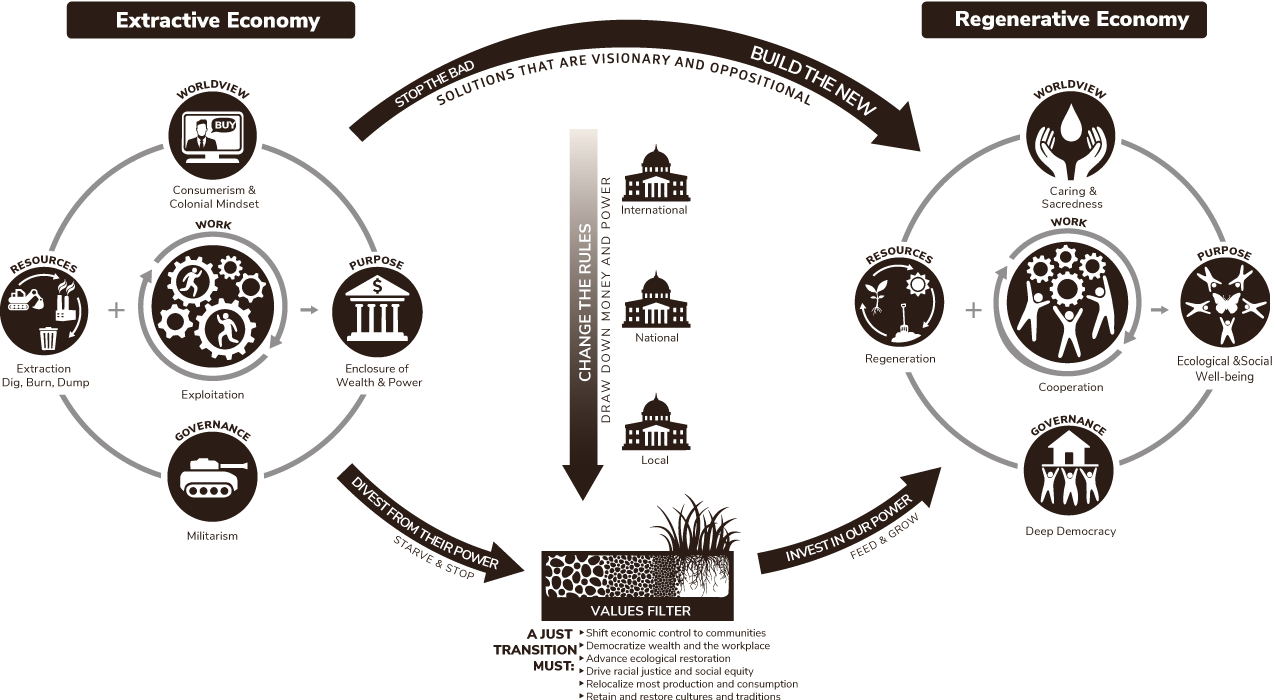
The Center for Coalfield Justice is excited to announce a new blog series written by our staff: Examining Climate. This year, CCJ staff members will be sharing their favorite (or least favorite) climate solution, looking at the benefits and the costs in the hope of sparking an honest conversation about how we address the climate crisis and keep our focus on environmental justice. This first blog in the series is written by our Executive Director Veronica Coptis.
The need for climate action has existed for a very long time, and in this moment, we’re starting to see governments and businesses take steps to reduce the amount of carbon in our atmosphere. While this is a critical action that we need to be taking in order to protect our communities from the impacts of an ever-changing climate, we cannot successfully address the climate crisis without also looking into what a just economic transition means for communities like ours that are dominated by coal and oil and gas extraction.
The centuries of fossil fuel extraction in places like Appalachia have created extractive economies where communities’ labor, land, and culture are being exploited for the benefit of a few. This has left our region with poor educational systems, failing infrastructure, and poverty. In order to equitably address this issue, we can’t just build new solar arrays and wind farms as sustainable energy solutions without also addressing the economic conditions that decades of fossil fuel extraction have left behind. For example, we’ve heard time and time again that there are more jobs in the solar industry than there are in the coal industry. But the question I would ask is: Are those jobs becoming available in the same geographical locations where people are losing access to well-paying full-time jobs? The answer is no. This is why ensuring that we have just transition principles built into our climate solutions is going to be critical for communities that have provided energy to this country for decades to not be left in the dark.
What is a Just Transition?
The Center for Coalfield Justice is a member of the Climate Justice Alliance (CJA), where Just Transition is a vision-led, unifying, and place-based set of principles, processes and practices that build economic and people power to shift from an extractive economy to a regenerative economy.
A Just Transition will not look the same in all communities. Here are the CJA Just Transition Principles that are consolidated and synthesized from the joint work of many of the community groups of CJA:
- A Just Transition moves us toward having just relationships with each other and the natural world we are part of.
- A Just Transition creates meaningful work that centers the development of people to learn, grow, and reach their full capacities.
- A Just Transition upholds self-determination that allows communities to have the power to shape their economies as producers, consumers, and in relationship to each other. Particularly the people most affected by extractive economies – frontline workers and fenceline communities – have the resilience and expertise to be in leadership crafting the solutions.
- A Just Transition equitably redistributes resources and power to build new systems that are good for all people and not just a few.
- A Just Transition requires repair to environments and re-localization and democratizing the production and consumption of energy, food, and goods in our communities.
- A Just Transition retains culture and traditions to provide inclusionary spaces for all traditions and cultures.
- A Just Transition embodies local, regional, national, and international solidarity. We recognize the interconnectedness of our communities and our issues.
- A Just Transition builds what we need now beginning at a local, small scale and expanding to displace extractive practices.
This video explains what an “economy” is and how we can shift ours away from extraction:
The image below shows our current extractive economy and contrasts it with the goal of shifting to a renewable economy.
What does this look like?
There are many examples of what it looks like to apply Just Transition principles in the real world as we address the climate crisis. When people think “solar farm,” for example, they likely think about vast fields occupied by solar panels – acres and acres of land that cannot otherwise be used. But! What if we apply Just Transition principles to this term? That’s where examples like this one in Colorado come up: a farmer gets to earn money by selling energy back to the grid from his solar arrays while growing crops beneath them. The plants benefit from some shade, less water evaporates, and the plants actually help to keep the panels cool. Simply plopping some solar panels on a mega-farm would likely not meet the definition of a Just Transition. Local ownership and decision-making are important components of this solution, known as agrivoltaics. At the end of the day, any solution to the climate crisis has to be respectful of the needs of people and the environment. It should not only take but give back, too.
CCJ has sought to live by these principles over the years by making sure our work results in more opportunities for community members to intervene in decision-making and advocate for the solutions they want to see in their towns. We have done this through canvassing different neighborhoods to hear directly from residents, hosting a solar festival, and advocating for more investment in our communities. In the coming years, utilizing these principles will look like pushing back on false solutions that keep the money in the pockets of CEOs and shareholders, developing community-driven plans for improving Greene County’s economy, and finding sustainable ways in which brownfield sites can be redeveloped.


Excellent blog and film presentation. Is the video available for others to use?
Thank you.
Ginny Hildebrand
Hi Ginny,
Thanks! The video is available here: https://vimeo.com/94603192